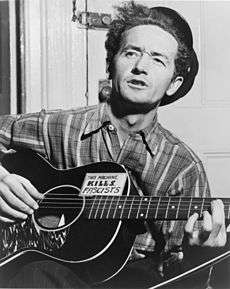So Long, It's Been Good to Know Yuh

"So Long, It's Been Good to Know Yuh" (originally titled "Dusty Old Dust"[1]) is a song by American folk musician Woody Guthrie first released in 1935, and part of his album Dust Bowl Ballads.[1] The composition is considered one of Guthrie's best songs, defining his style, and demonstrating his "increasing comfort with writing topical songs about the poor and downtrodden".[2] It has been categorized as a "Dust Bowl ballad" by music critics.[3] The song was also included in the Library of Congress Recordings from 1940 made by Guthrie and Alan Lomax.[4]
Music and lyrics
The song was based on music used in Carson Robison's "Ballad of Billy the Kid" of the 1930s, which Guthrie slightly modified, adding new lyrics.[3][5] It is written in a 3/4 time signature and has four-part harmony.
The composition tells about the hard times that Americans experienced during the Great Depression, especially the "harsh weather and drought conditions" experienced by farm workers in the Western United States.[3] Guthrie himself had lived in the town of Pampa, Texas, and had witnessed the devastating Black Sunday dust storm of April 14, 1935.[1]
The repetitive chorus has been described as "a witty, black retort, utterly negative and apocalyptic": "We talked of the end of the world, and then/We'd sing a song an' then sing it again/We'd sit for an hour an' not say a word/And then these words would be heard:/So long, it's been good to know yuh".[6]
Guthrie also wrote a version of the song with alternate lyrics about serving in the Second World War.
Commercial success
Although the song had a limited success during its 1930s release by Guthrie, its popularity soared in 1951 when it was recorded by The Weavers with different verses.[7] The song peaked at number four on the pop music charts in 1951,[8] and became known as one of the Weavers' "staple" tunes.[9]
The song is occasionally used as a closing song on the variety show A Prairie Home Companion, usually with additional comical verses written by host Garrison Keillor.
References
- 1 2 3 Eunice Rojas, Lindsay Michie (2013). Sounds of Resistance: The Role of Music in Multicultural Activism. ABC-CLIO. p. 68. ISBN 0313398062.
- ↑ Brian Cogan, Tony Kelso (2009). Encyclopedia of Politics, the Media, and Popular Culture. ABC-CLIO. p. 252. ISBN 0313343799.
- 1 2 3 William H. Young, Nancy K. Young (2005). Music of the Great Depression. ABC-CLIO. p. 157. ISBN 0313332304.
- ↑ Allmusic. Library Of Congress Recordings. Retrieved on April 6, 2014.
- ↑ Steve Sullivan (2013). Encyclopedia of Great Popular Song Recordings, Volume 2. Scarecrow Press. ISBN 0810882965.
- ↑ Edward Comentale (2013). Sweet Air: Modernism, Regionalism, and American Popular Song. University of Illinois Press. p. 151. ISBN 0252094573.
- ↑ William H. Young, Nancy K. Young (2007). The Great Depression in America: A Cultural Encyclopedia. 2. Greenwood Publishing Group. p. 227. ISBN 0313335222.
- ↑ Cohen, Ronald D. (2012). Woody Guthrie: Writing America's Songs. Routledge. p. 38. ISBN 0415895685.
- ↑ Revkin, Andrew C. (1 February 2014). "So Long, It's Been Good to Know You, Pete Seeger". The New York Times. Retrieved 6 April 2014.